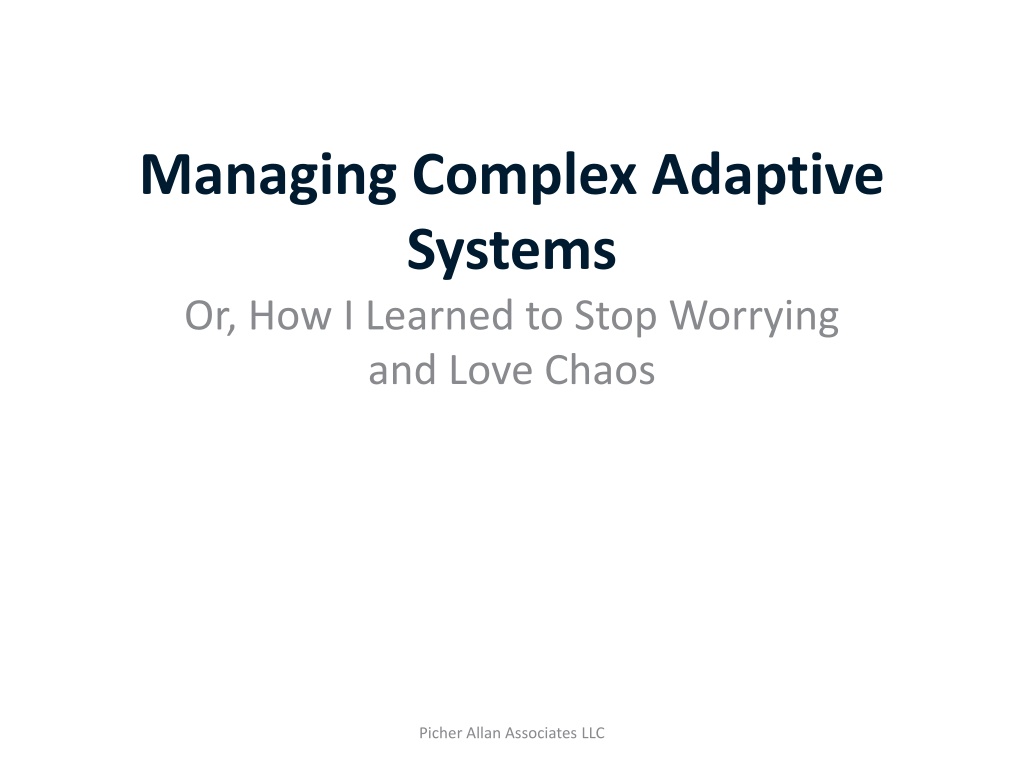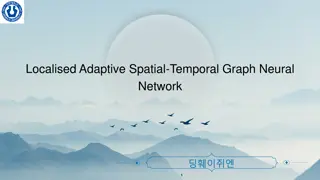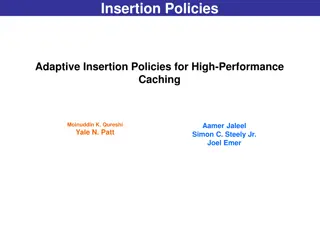Navigating Complexity: Leadership and Management in Adaptive Systems
Explore the dynamic world of complex adaptive systems, where traditional command-and-control methods fall short. Learn the value of decentralized management, hybrid organizational structures, and the essential skills needed to thrive in a networked environment. Embrace chaos, foster creativity, and adapt to changing circumstances for effective leadership in complex organizations.
Download Presentation

Please find below an Image/Link to download the presentation.
The content on the website is provided AS IS for your information and personal use only. It may not be sold, licensed, or shared on other websites without obtaining consent from the author. Download presentation by click this link. If you encounter any issues during the download, it is possible that the publisher has removed the file from their server.
E N D
Presentation Transcript
Managing Complex Adaptive Systems Or, How I Learned to Stop Worrying and Love Chaos Picher Allan Associates LLC
Self Organizing Groups Leadership Lessons in Three Minutes Picher Allan Associates LLC
Complex Adaptive Systems Simple Complicated Complex Baking a Cake Sending a Rocket to the Moon Raising a Child Picher Allan Associates LLC
Command and Control vs. Decentralized Management Picher Allan Associates LLC
Management by: Instruction Objectives Values http://t2.gstatic.com/images?q=tbn:ANd9GcRBB78iz8r2wUO7Tj7AIrLE0EAq2tvSN9djy4RvR3wcYUMnCiGx http://t3.gstatic.com/images?q=tbn:ANd9GcSRJJuU46u_fGjF7De0o2piFr2uW4mYdb82a6hpqh404qHFcqsf Picher Allan Associates LLC
Why Manage Networks Most social problems are complex Networks and Partnerships are necessary Command and control doesn t work with networked people and projects It doesn t adapt well to changing circumstances and local initiative Decentralized management allows flexibility and creativity Picher Allan Associates LLC
Hybrid Form of Organization Hierarchical in some places, chaotic in others Always shifting, evolving Must be stable in spots with closely monitored deliverables Picher Allan Associates LLC
Leadership in Complex Organizations http://t3.gstatic.com/images?q=tbn:ANd9GcSgA-BEY0OQjOSxyPg6Z3P2Pwrf-SK8SAwZTuY6wH77bZIfYBjHhg Picher Allan Associates LLC
Skills Needed to Manage this Kind of Structure Influence rather than control Ability to generate shared values Build relationships Comfort with a balance of stability and disorder High level of autonomy High level of responsibility Freedom to innovate from any part of the network Picher Allan Associates LLC
In the Non-profit sector we tend to believe that we measure what we value. But instead we often value only what we can measure. Picher Allan Associates LLC
Not everything that can be counted counts, and not everything that counts can be counted. -- A sign on the wall of Albert Einstein s office Picher Allan Associates LLC
Intuition Rapid Adaptive Subtle Experiential Resourceful Inexpensive Sensitive Insightful Perceptive to semiconscious & unconscious Picher Allan Associates LLC
Intuition Uncertain Inexact Unprovable Unexplainable Unteachable (?) Conducive to generalization & stereotypes Self-validating Sometimes (often?) wrong Picher Allan Associates LLC
Intuition Works Best To decide what to do when you don t know what to do When you have incomplete information When the consequences of being wrong are less than the consequences of not acting while waiting for complete information When rapid decisions are required Picher Allan Associates LLC
And In highly complex situations In rapidly changing circumstances In confusing, ambiguous or vague situations When confronting uncertain risk In the absence of scientific proof When cheap, simple solutions are preferred Picher Allan Associates LLC
Networks Require Communications The Right Kinds in the Right Amounts Picher Allan Associates LLC
Principles for Managing Complex Adaptive Systems http://t2.gstatic.com/images?q=tbn:ANd9GcQBfBhCEV68s_XHa9Fxxs7yDn031-TqfrF_kY01HW0E4SlGrRUsoA From Curt Lindberg, VHA, Inc.; Paul Plsek of Paul Plsek & Associates; and Brenda Zimmerman, York University. Picher Allan Associates LLC
Principles for Managing Complex Adaptive Systems 1. Complexity lens View your system through the lens of complexity... http://t2.gstatic.com/images?q=tbn:ANd9GcTp09X7NSOC5zW-vu9BF8r4QLbH7b2snA-mw-iywdqXFfq35WaF rather than the metaphor of a machine or a military organization. Picher Allan Associates LLC
Principles for Managing Complex Adaptive Systems http://t1.gstatic.com/images?q=tbn:ANd9GcQHQkUj8eu1F8r30aqfOGzRwf5tzFyIeI0inGOI-0xQPvc-xsxP 2. Good enough vision Build a good enough vision and provide minimum specifications... rather than trying to plan out every little detail. Picher Allan Associates LLC
Principles for Managing Complex Adaptive Systems http://t1.gstatic.com/images?q=tbn:ANd9GcRklZZXGfPfLUvBMvkqUhjJ0sUhcOnXellVt5mmMEflf039h5xUzQ 3. Clockware/swarmware When life is far from certain, lead from the edge, with clockware and swarmware in tandem... that is, balance data and intuition, planning and acting, safety and risk, giving due honor to each. http://t1.gstatic.com/images?q=tbn:ANd9GcSMxFYybOs7E5dt4mr66HvHPnmbQw3MfoHK-6tfcQpBvbKIJ4-bew Picher Allan Associates LLC
Principles for Managing Complex Adaptive Systems 4. Tune to the edge Fostering the "right" degree of: information flow, diversity and difference, connections inside and outside the organization, power differential, and anxiety... instead of controlling information, forcing agreement, dealing separately with contentious groups, working systematically down all the layers of the hierarchy in sequence, and seeking comfort. Picher Allan Associates LLC
Principles for Managing Complex Adaptive Systems 5. Paradox Uncover and work paradox and tension... rather than shying away from them as if they were unnatural. Picher Allan Associates LLC
Principles for Managing Complex Adaptive Systems 6. Multiple actions Go for multiple actions at the fringes, let direction arise... rather than believing that you must be "sure before you proceed with anything. http://t0.gstatic.com/images?q=tbn:ANd9GcTV40l8iOn-6jaGANSPGtW4NJaVJwkl-9q_zDBMzyYagmtYtpxP3Q Picher Allan Associates LLC
Principles for Managing Complex Adaptive Systems 7. Shadow system Listen to the shadow system.. that is, realize that informal relationships, gossip, rumor, and hallway conversations, contribute significantly to agents' mental models and subsequent actions. Picher Allan Associates LLC
Principles for Managing Complex Adaptive Systems 8. Chunking Grow complex systems by chunking... that is, allow complex systems to emerge out of the links among simple systems that work well and are capable of operating independently. Picher Allan Associates LLC
So Whats It All About Traditional management methods don t seem to fit well in networks Self organizing teams Manage by values High level of communication required to share values and agree on work Picher Allan Associates LLC
Managing Complex Adaptive Systems Or, How I Learned to Stop Worrying and Love Chaos Chris Allan, Picher Allan Associates LLC www.chrisallan.info Chet Tchozewski, chet@tchozewski.com Picher Allan Associates LLC

















































